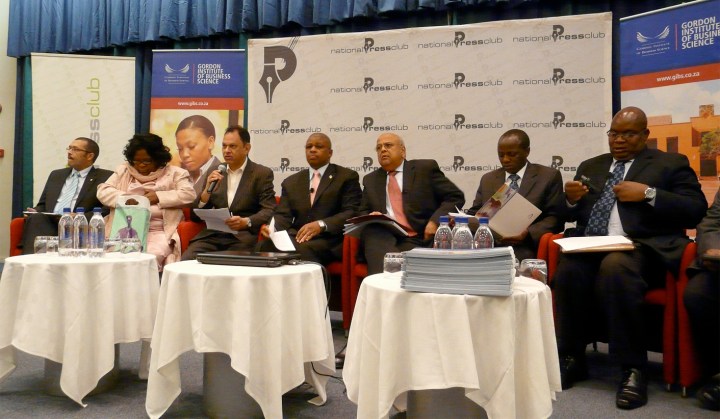South Africa
Auditor-general’s report on municipalities: Cloudy, with remote chance of improvement

The auditor-general Terence Nombembe has released his report on the audit outcomes of local government, and the picture is still very bleak. Clean audits for most municipalities are far away. Cabinet ministers, parliamentarians and local government officials were at the briefing to hear his report and, even more importantly, his recommendations. By SIPHO HLONGWANE.
Six new municipalities have achieved clean audit results this year, on top of the seven that achieved this last year. But the 13 clean audits represent just 5% of all municipal entities that were audited. They are in KwaZulu-Natal, Limpopo, Mpumalanga and the Western Cape.
Not one municipality in the other provinces received such a ranking. Only four municipal entities (local government’s version of state-owned companies) registered clean audits, which is a decline from 10 last year. Not one metropolis received a clean audit this year. Previously, Cape Town achieved this mark.
Close to half of the 343 auditees (municipalities plus municipal entities) obtained financially unqualified audit reports, but with internal control findings. 55% of municipalities received either financially qualified and adverse opinions or disclaimers, and 13% of municipalities did not submit financial statements in time for auditing.
This is according to the 2010-2011 consolidated general report on the audit outcomes of local government, released by auditor-general Terence Nombembe on Monday in Johannesburg.
Nombembe said those municipalities that either returned consistently good results or achieved a turnaround did so because of decisive action by the leaders and key officials.
“What these provinces are beginning to display is the outcome of concerted efforts on the part of political leaders and management. They are moving forward to the clean audit space by consistently committing to taking ownership of municipal performance practices, insisting on adequately qualified staff and effective performance management practices,” the auditor-general said.
“The next logical step for these municipalities is to institutionalise these gains to sustain the culture of clean administration. This will surely uphold the public confidence that we witnessed during the presentation of the clean audit awards held at each of the municipalities.”
The slow progress towards clean audits is because municipalities are slow to respond to the auditor-general’s messages and implementation of key controls – over 50% of municipalities were marked as having this problem. Most auditees displayed a lack of consequences for poor performance and transgressions, and they had a lack of minimum competencies for officials in key positions – most evident in financial discipline. The lack of skills means that it is the auditors who have to come in and clean the books for most of the municipalities, which only then get it right.
“We are seeing the impact of the lack of skills, the slow response of leadership to owning key controls, as well as the absence of managing poor performance and the risks that municipalities continue to face,” Nombembe said. “At the moment these risks are beyond tolerable levels.”
The five major risks that were identified are: a growing trend of irregular expenditure in supply chain management; service delivery reporting; minimal improvement in internal IT controls; minimal improvement in human resource management; and significant errors in financial statements.
Errors that crop up because of incompetency refuse to go away, even though most municipalities hire consultants to do the work of government officials. Only 30% of municipalities are making good progress in addressing internal control disciplines.
Nombembe said he and his staff would continue visiting troubled municipalities to provide assistance as part of Operation Clean Audit, which was launched in 2008.
However, the problem is that the responsibility for good administration lies with the political and administrative heads of local governments: mayors, executive councils and municipal managers. In terms of our law, there are as many governments at the local level as there are municipalities, and there is very little in the way of direct intervention that can come from provincial or national government.
Monitoring and evaluation minister Collins Chabane said the national government’s hands were largely tied because of the law. “It is not easy to intervene unless certain criteria are met,” he said. “And often by the time the criteria are met it is too late. So if the executive and administrative heads in that municipality do not decide to do something, we can’t as well.”
Chabane said his ministry would be conducting a study to see if there was any connection between bad audit results and poor service delivery resulting in protests.
Finance minister Pravin Gordhan also said he was disappointed that metropolitans, who have sufficient resources, are failing to achieve fairly straightforward objectives.
The treasury will now adopt a more hands-on approach to its financial oversight role. “We are now going to implement the announcement we made in the budget speech. Within the next two weeks we will start advertising for the position of chief procurement officer. We are going away from passive oversight to actively enforcing the implementation of procurement legislation,” Gordhan said.
The chief procurement officer will have some punitive powers over those who flout procurement rules.
Nombembe said they are working on a mechanism to prevent irregular spending. A pilot study is being conducted in the Eastern Cape.
However, Gordhan said we should not forget that we are a young democracy and the focus is on building institutions. “If there is one mitigating factor, it is this,” he said.
The message from the auditor-general was very clear: most municipalities are stuffing up their financial records simply because the leaders can’t be bothered to implement the right processes. DM
Photo: House chairperson for oversight & ICT in the National Assembly Cedric Frolick, House chairperson for intergovernmental and international relations in the National Council of Provinces Nosilivere Magadla, National Press Club chairman Yusuf Abramjee, auditor-general Terence Nombembe, finance minister Pravin Gordhan, monitoring and evaluation minister Collins Chabane and cooperative governance and traditional affairs minister Richard Baloyi. DAILY MAVERICK/Sipho Hlongwane




















 Become an Insider
Become an Insider